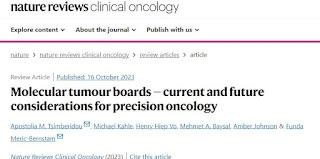Journal Club
Tsimberidou, A.M., Kahle, M., Vo, H.H. et al.
Molecular tumour boards — current and future considerations for precision oncology.
Nat Rev Clin Oncol (2023). https://doi.org/10.1038/s41571-023-00824-4
I first attended oncology tumor boards as a pathology resident at UCLA 30 years ago, in the early 90s, and continued as an attending at NYU and Northwestern, through 2001. Early on, tumor boards helped deal with uncertainty: a patient might, or might not, get chemotherapy; might, or might not, depending, get radiation; might, or might not, have a pair of mets ablated. Moving into the 2010s, oncology also got more complexity, as more and more mutations were associated with drugs (EGFR, ALK, ROS1).
Today, more than ever, oncology is complexifying rapidly, and a few years from now there may be more proteomics, RNA-omics, methylomes, and other input to drug response. How are tumor board systems evolving, and how should they evolve if agility and growth is a key parameter? These are some of hte topics in TSIMERIDOU, Nat Rev Clin Oncol, released October 16, 2023.
See the citation and link above, and see a summary of the paper below.
###
[Tsimberidou via Chat GPT-3.5]
The field of oncology has seen significant advancements in our understanding of cancer biology and the development of targeted therapies in recent years. However, this progress has also led to increased complexity in the diagnosis and treatment of cancer. Tumors are recognized as highly heterogeneous, with different molecular profiles and responses to treatment.
Tumor boards were designed to address this complexity by bringing together multidisciplinary teams of experts to review individual cases, discuss treatment options, and make personalized recommendations based on the patient's unique molecular profile and clinical history. These boards play a crucial role in guiding treatment decisions, especially in cases where (1) standard treatments may not be effective or where (2) multiple therapeutic options are available.
However, as the field of oncology continues to advance, tumor boards are facing new challenges. The explosion of molecular data, including genomic sequencing, has provided a wealth of information about tumor characteristics and potential targeted therapies. While this is a positive development, it also presents challenges in terms of interpreting and prioritizing this vast amount of data. Tumor boards must stay up-to-date with the latest research and treatment options to provide the best recommendations for patients.
Another challenge is the timely turnaround of molecular profiling results. While advanced technologies have sped up the process, there can still be delays in obtaining these critical results. Patients often require bridging therapies while waiting for the molecular profile, which can affect the timing and effectiveness of treatment. [*]
Access to matched targeted therapies is another issue. While many promising therapies are in development or available through clinical trials, not all patients have equal access to these treatments. Disparities in access to advanced diagnostics and therapies need to be addressed to ensure that all patients have a fair chance at receiving the most appropriate treatment.
To meet these new challenges, tumor boards are evolving.
- They are incorporating artificial intelligence (AI) and machine learning tools to assist in data interpretation and treatment recommendations. These tools can help analyze large datasets and identify potential treatment options more efficiently.
- However, it's essential to ensure that AI systems are based on high-quality data and validated through rigorous clinical studies.
Additionally, tumor boards are exploring ways to streamline the process from molecular profiling to treatment initiation. [**] Efforts are being made to reduce turnaround times and improve the availability of targeted therapies, especially through clinical trials. This includes centralizing tumor board functions in some cases to ensure consistent, high-quality care.
In conclusion, while the increasing complexity of oncology presents challenges for tumor boards, they remain a critical component of personalized cancer care. By embracing new technologies, staying informed about the latest research, and addressing disparities in access to care, tumor boards can continue to evolve and play a pivotal role in improving patient outcomes in the era of precision oncology.
SEE ALSO
Scheiter, 2022, review of tumor board experience in Germany.
https://www.nature.com/articles/s41416-022-02120-x
O'Dwyer, 2023, review of NCI MATCH and its lessons.
https://www.nature.com/articles/s41591-023-02379-4
___
[*] NCCN guidelines for lung cancer provide one path for patients without genomics (awaiting genomics) and a different guideline path for tumors that do have genomics.
[**] I have seen some interesting presentations and papers from MGH on this topic. Eg Dagogo-Jack 2023, https://pubmed.ncbi.nlm.nih.gov/37437226/

